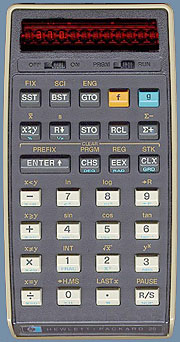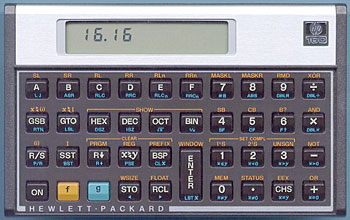|
 When I was 17 I bought an HP-25 calculator, billed as "the minimum computer". (Check out this HP-25 review from Creative Computing, circa 1977.) I remember distinctly it cost $350 in 1976 dollars. At the time it was the single largest purchase I had ever made. I loved that little machine, and spend hours composing programs for it. Quite amazing what it was able to do with essentially little more than a programmable calculator's instruction set. And of course no external store - every program had to be hand-entered each time. Its ability to do really big floating point numbers was amazing for its day... (Chemistry students do *lots* of floating point calculations.) I still have it - and it still works! When I was 17 I bought an HP-25 calculator, billed as "the minimum computer". (Check out this HP-25 review from Creative Computing, circa 1977.) I remember distinctly it cost $350 in 1976 dollars. At the time it was the single largest purchase I had ever made. I loved that little machine, and spend hours composing programs for it. Quite amazing what it was able to do with essentially little more than a programmable calculator's instruction set. And of course no external store - every program had to be hand-entered each time. Its ability to do really big floating point numbers was amazing for its day... (Chemistry students do *lots* of floating point calculations.) I still have it - and it still works!
If you have never used an HP-25 - and especially if you have! - please check out Larry Leinweber's fantastic Java HP-25 emulator; go to this page, and scroll down until you see the R/S button, then click on it.
Back in 1977 the big computing wars were between Hewlett-Packard and Texas Instruments. Each side had vociferous supports, and drew derision from the other. HP was famous for using RPN, aka Reverse Polish Notation, which is essentially stack-based math. The TI used a more conventional algorithmic notation, including support for punctuation like parenthesis. RPN was cool because it saved keystrokes and made programming easier, and also because it was so different; the average person couldn't even pick up an HP calculator and add two numbers together. (You enter the first number, push the ENTER key, then enter the second number, then push PLUS. There is no EQUALS in RPN.)
 I was reflecting on this little guy recently when using my Handspring Treo's calculator, which oh-by-the-way does hexadecimal arithmetic. (In addition to being a 'phone, and an address book, and a calendar, and an email client, and a web browser.) Amazing the progress which has been made in 25 years... Programming the HP-25 to perform hex arithmetic was highly non-trivial, but I did it; in those days most programming was done in assembler, and 16-bit machines used hex. Just to completely date myself; I *still* know most of the ASCII to EBCDIC conversion table by heart. I was reflecting on this little guy recently when using my Handspring Treo's calculator, which oh-by-the-way does hexadecimal arithmetic. (In addition to being a 'phone, and an address book, and a calendar, and an email client, and a web browser.) Amazing the progress which has been made in 25 years... Programming the HP-25 to perform hex arithmetic was highly non-trivial, but I did it; in those days most programming was done in assembler, and 16-bit machines used hex. Just to completely date myself; I *still* know most of the ASCII to EBCDIC conversion table by heart.
(Later I got an HP-16 which was the ultimate godsend for hex assembler programmers; yeah, I still have it, and yeah, it still works, too.)
If you look around, you'd have to conclude that the pace of technological progress is not slacking; to the contrary, new stuff is popping up all over the place. So if this is the progress made in the last 25 years, what will the next 25 years bring? Hard to imagine any qualitative improvement over a Treo, but probably in five years we'll read this page and laugh!
|




